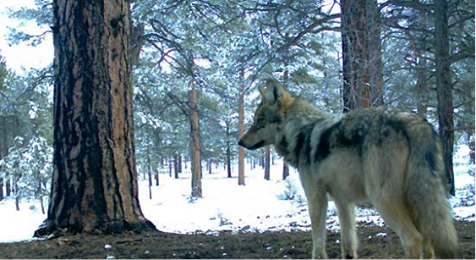
As a Coloradan deeply concerned about the future of the rich wildlife and natural resource legacy that makes our state so great, I am very concerned that you–our state’s leading wildlife managers–may be falling into the trap of our neighboring states’ baseless anti-predator rhetoric. I respectfully request that you reject Resolution 16-01 because it fails to reflect the values of the majority of our state’s citizens and is scientifically unsound.
Resolution 16-01 seeks to obstruct the reintroduction and/or introduction of gray wolves and Mexican wolves into Colorado. Mexican wolves are one of our nation’s most endangered species. With only 109 wolves in the wild, our state can play a leading role in ensuring the species’ recovery, and eventual removal from the list of species protected by the Endangered Species Act. It is unacceptable to deny critically imperiled Mexican wolves access to quality habitat in Colorado. The anti-wolf resolution must be denied for three primary reasons.
First, the Resolution is scientifically flawed in its representation of the historic range of Mexican wolves. The Resolution fails to consider the best available science when it claims that Colorado was never a part of Mexican wolves’ historic range. Former scientific tools used in identifying species and subspecies have evolved from morphological metrics to molecular (DNA) techniques, blurring the lines of historical range demarcations of the past. Colorado must not rely on outdated data that fails to consider the presence of Mexican wolf genetic markers in Colorado and Utah.
Wolves belong in Colorado. Regardless of whether you accept that Mexican wolves once freely roamed our state’s grand landscape, the impending effects of climate change demand that we step up to the plate as hosts for the next generation. With rising temperatures and a changing climate, some of the most suitable habitat for Mexican wolves lies far north of the arbitrary I-40 boundary, in the heart of our great state.
Regardless of our state’s historic range status, the Endangered Species Act does not prevent recovery from taking place in Colorado. There simply is no provision in the Act that requires recovery be limited to a species’ historic range. Rather, the express language of Section 10(j) provides that Mexican wolves may be released “outside the current range of such species if the Secretary determines that such release will further the conservation of such species.” 16 U.S.C. § 1539(j)(2)(A).
Second, the Resolution fails to give due weight to the recommendations of the state’s own Wolf Management Working Group (“Working Group”). In fact, the Resolution flies in the face of the Working Group’s recommendations, which plainly advise that we “[a]ccept a wolf presence in Colorado,” and that “[m]igrating wolves should be allowed to live with ‘no boundaries’ where they find habitat.” Colorado Wolf Management Working Group, Findings and Recommendations for Managing Wolves that Migrate into Colorado at 3 (Dec. 28, 2004) (hereinafter “Findings”).
The Working Group, a 14-member team comprised of appointed wildlife biologists, livestock producers, sportsmen, government officials, and wildlife advocates, was convened in 2004 to address potential wolf management issues in the state. The Resolution falsely claims it is supported by the Working Group’s recommendations. The Resolution appears to completely ignore the thorough analysis, discussion, and recommendation of the Working Group, which recognize that “[p]ositive impacts [from wolves], where they occur, should be recognized and utilized, and can include, but are not limited to: an additional tool for managing the overpopulation of ungulates; dispersal of wild ungulates resulting in habitat improvement due to less pressure on the landscape, especially in riparian areas; a decreased possibility of disease transmission from ungulate overpopulation and concentration; tourism opportunities; and non-monetary values such as existence values and vicarious use.” Findings at 4. I am very concerned that the Commission is ignoring all of the positive impacts of having wolves on the landscape and instead clinging to outdated negative stereotypes about wolves.
Third, the Resolution is based on false notions of excessive livestock depredation and wild ungulate population damage. The fact is that the state has, for decades, attempted to keep ungulate populations unnaturally high to accommodate the demands of hunters and provide income to wildlife agencies through hunting licenses and fees, and that has in turn damaged our state’s ecosystems.
As essential predators, wolves keep ungulate populations in-check at ecologically sustainable levels through the natural predator/prey relationship. Wolves do not operate to eliminate their food supply, but rather, have evolved mechanisms to keep their own populations in check by defending their territories and limiting breeding in packs to the alpha pair.
Indeed, allowing Mexican wolves to roam Colorado’s landscape is likely to have only negligible impacts on livestock resources, if any. As compared to other causes of death, such as weather and disease, predator depredations of cattle and calves are minimal. For example, in 2010, 94.5% of total losses of cattle and calves in the United States were attributed to non-predator causes. U.S. Dep’t of Agric., Nat’l Agric. Statistics Serv., Cattle Death Loss (May 2011). Further, the Resolution fails to account for the many non-lethal management tools available that can prevent depredations, and the availability of compensation programs to account any wolf depredation events, should they occur.
In sum, I ask that the Commission live up to the Department of Parks and Wildlife’s mission to “perpetuate the wildlife resources of the state.” Colorado Parks and Wildlife, About Us, http://cpw.state.co.us/aboutus (last visiting Dec. 7, 2015). As evidenced by a 2013 poll, a wide majority (72%) of Coloradans are in favor of protecting wolves that cross the Colorado state-line from other areas. Peak Campaigns 2013. It is past time that you work for the majority of your public constituents: non-consumptive users of our state’s wildlife. Please make a decision based on the best available science and the desires of the majority of your constituents and reject Resolution 16-01. Thank you for your consideration.
